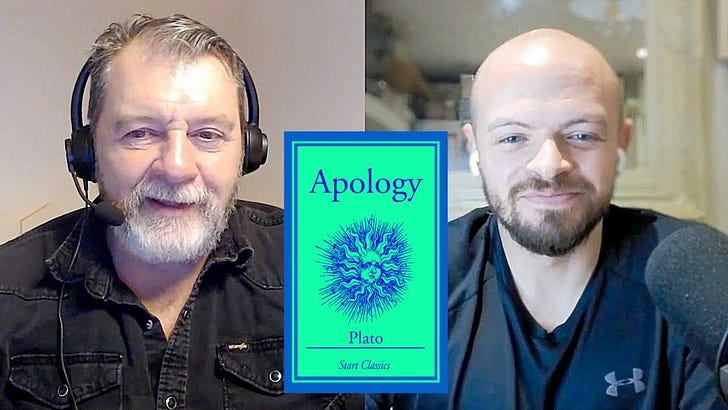If you could only recommend one book to everyone, what would it be?
For renowned Stoicism writer
, the answer is clear: Plato’s Apology. In a recent interview, Donald explained why this short but profound work stands apart as the ultimate introduction to philosophy and why it continues to resonate with readers thousands of years after it was written.Let’s explore what makes The Apology so impactful, how it influenced ancient thinkers like Marcus Aurelius and Epictetus, and the timeless lessons it offers about courage, mortality, and the pursuit of virtue.
Watch the video below 👇
—
Notes 📝
Why Donald Robertson Recommends Plato’s Apology
Donald begins with a bold claim: Plato’s Apology is the only book he universally recommends. While he occasionally suggests books to individuals he knows well, he finds it presumptuous to broadly recommend most books. The Apology, however, is the exception.
Here’s why:
It’s Accessible: At just a few hours’ read, The Apology is short and straightforward, making it an ideal starting point for anyone new to philosophy. Unlike some of Plato’s longer dialogues, it doesn’t require a deep academic background to understand.
It’s Dramatic: The text recounts Socrates’ courtroom defense as he faces trial for corrupting the youth of Athens and introducing new gods. This high-stakes setting makes it more engaging and relatable than abstract philosophical treatises.
It Plants Seeds of Philosophy: Rather than presenting fully fleshed-out arguments, The Apology introduces core ideas that provoke deep thought and stay with readers for years. It’s a work that “creates images in your mind,” Donald notes, sparking reflection long after you’ve finished reading.
It’s Culturally Foundational: The Apology was immensely influential in the ancient world. To understand any ancient philosophy, it’s essential to know this text. Figures like Marcus Aurelius and Epictetus were profoundly shaped by it, making it a cornerstone of the Western philosophical tradition.
Socrates on Mortality and the Fear of Death
One of the most striking aspects of The Apology is Socrates’ fearless attitude toward death. For Socrates, the fear of death stems not from the event itself but from our beliefs about it. This idea would later become a cornerstone of Stoic philosophy.
Donald highlights a famous passage from The Apology where Socrates suggests that death might even be a blessing. If it’s an eternal sleep, what’s there to fear? And if it’s a transition to another realm, why not embrace it? This perspective has inspired countless readers and influenced thinkers like Epictetus, who taught that “people aren’t upset by events but by their opinions about them.”
Socrates’ attitude wasn’t born in isolation. By the time of his trial, he was in his seventies and had lived through wars, plagues, and the deaths of many friends. His life experiences allowed him to come to terms with mortality, demonstrating that courage in the face of death is achievable through philosophical reflection.
A Defense of Philosophy
At its core, The Apology is not just a defense of Socrates but of philosophy itself. Socrates argues that improving one’s character and seeking virtue are more important than preserving one’s life. This message is as radical today as it was in ancient Athens.
Socrates’ unapologetic stance during his trial is a testament to his commitment to truth and integrity. Rather than pleading for his life, he engages in philosophical debate, even interrogating his accusers. Donald describes this as “doing the very thing they put him on trial for.” Socrates’ courage and conviction inspire readers to prioritize principles over comfort or safety.
The Apology’s Lasting Impact
Donald emphasizes that Plato’s Apology isn’t just a historical text; it’s a living work that continues to shape how we think about philosophy, courage, and the human condition. Whether or not you agree with Socrates’ arguments, his ideas force us to confront life’s deepest questions. “Weeks, months, years, decades later, you’re still thinking about the stuff he said,” Donald notes.
Watch the Full Discussion
To dive deeper into Donald Robertson’s thoughts on Plato’s Apology and its relevance to Stoicism, watch the full interview clip below:
Further Reading:
Have you read Plato’s Apology? What lessons did you take away from it? Share your thoughts in the comments below!





After listening to this discussion & teaching, I bought and read Plato’s Apology on Audible. So amazing, so wonderful!
Which translation do you recommend ?